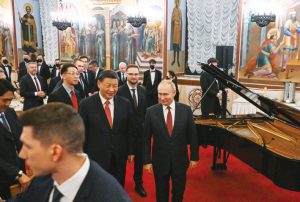BLOOMBERG
Xi Jinping’s meetings in Moscow with Vladimir Putin put the Biden administration in an uncomfortable position: on the sidelines as two adversaries discuss a Ukraine peace proposal that the US has deemed unacceptable.
US officials have publicly expressed deep skepticism about the Chinese idea, saying its call for a cease-fire would reward Moscow’s invasion by cementing its territorial gains. Privately, though, the meetings and the proposal have provoked a sense of unease within the administration, leading in turn to questions about the broader US approach to the two countries.
According to one administration official, who asked not to be identified discussing internal deliberations, the US is worried about being backed into a corner over the Chinese proposal. Regardless of the US reservations, dismissing it outright could let China argue to other nations that are weary of the war — and of the economic damage it’s wreaking — that Washington isn’t interested in peace.
If the US spurns the agreement, “China will likely ramp up messaging that the US is opposed to a cease-fire, that the US is opposed to the end of the war,†said Bonny Lin, a fellow at the Center for Strategic and International Studies who once served at the Pentagon. “There will be lots of ways in which China will try to spin whatever comes from the China-Russia meeting in a way that seeks to portray the US in negative light.â€
The debate over China’s version of a peace plan highlights just one of the many uncomfortable realities that were brought home by Xi’s three-day visit to Moscow, which saw the Chinese leader greeted warmly by Putin. The two countries pledged to deepen their partnership even further.
The Biden administration has tried to keep China on the sidelines since the start of the Ukraine invasion, but the opposite appears to have happened. Even as Xi and Putin grow closer, China is finding a receptive audience for its broader diplomatic push around the globe.
At a Senate hearing, Senator Jeff Merkley asked Secretary of State Antony Blinken to respond to what the Oregon Democrat called a “three-day bro-fest with Putin and Xi celebrating authoritarian power.†Blinken acknowledged it was a continuation of the two nations’ pledge right before the war of a “partnership with no limits.â€
China has shrugged off US sanctions over its companies’ partnership with Russia. Major global economies such as India and Brazil are refusing to choose between China and the West, arguing they don’t want a new Cold War.
And a week ago, Honduras began the process of giving up its diplomatic ties with Taiwan in favour of economic links with China.
The move was “a sign of my determination to fulfil the government plan and expand frontiers freely in harmony with the nations of the world,†President Xiomara Castro said in a tweet.
It’s all taking place as US ties to China, which began to fray with former President Donald Trump’s trade war, keep getting worse. That was underscored by the furore over the alleged Chinese spy balloon that provoked a national outcry in the US and angry recriminations between Washington and Beijing.
 The Gulf Time Newspaper One of the finest business newspapers in the UAE brought to you by our professional writers and editors.
The Gulf Time Newspaper One of the finest business newspapers in the UAE brought to you by our professional writers and editors.
